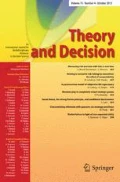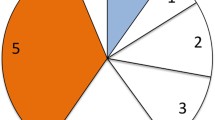Abstract
We study ultimatum and dictator variants of the generosity game. In this game, the first mover chooses the amount of money to be distributed between the players within a given interval, knowing that her own share is fixed. Thus, the first mover is not confronted with the typical trade-off between her own and the other’s payoff. For each variant of the game, we study three treatments that vary the range of potential pie sizes so as to assess the influence of these changes on the first movers’ generosity. We find that removing the trade-off inspires significant generosity, which is not always affected by the second mover’s veto power. Moreover, the manipulation of the choice set indicates that choices are influenced by the available alternatives.
Similar content being viewed by others
References
Andreoni J., Miller J. (2002) Giving according to GARP: An experimental test of the consistency of preferences for altruism. Econometrica 70: 737–753
Bacharach, M. (2006). In N. Gold & R. Sugden (Eds.), Beyond individual choice: Teams and frames in game theory. Princeton, NJ: Princeton University Press
Bardsley N. (2008) Dictator game giving: Altruism or artefact?. Experimental Economics 11: 122–133
Engelmann D., Normann H.-T. (2010) A within-subject analysis of other-regarding preferences. Games and Economic Behavior 72: 321–338
Bolton G. E., Ockenfels A. (2000) ERC: A theory of equity, reciprocity, and competition. American Economic Review 90(1): 166–193
Bolton G. E., Ockenfels A. (2006) Inequality aversion, efficiency, and maximin preferences in simple distribution experiments: Comment. American Economic Review 96(5): 1906–1911
Brandts J., Charness G. (2000) Hot vs. cold: Sequential responses and preference stability in experimental games. Experimental Economics 2: 227–238
Camerer C. F. (2003) Behavioral game theory: Experiments in strategic interaction. Princeton University Press, Princeton, NJ
Cason T. N., Mui V.-L. (1998) Social influence in the sequential dictator game. Journal of Mathematical Psychology 42: 248–265
Charness G., Rabin M. (2002) Understanding social preferences with simple tests. Quarterly Journal of Economics 117: 817–869
Cox, J. C., & Sadiraj, V. (2010). Direct tests of individual preferences for efficiency and equity. Economic Inquiry. doi:10.1111/j.1465-7295.2010.00336.x.
Dana J., Weber R. A., Kuang J. X. (2007) Exploiting moral wiggle room: Experiments demonstrating an illusory preference for fairness. Economic Theory 33: 67–80
Engelmann D., Strobel M. (2004) Inequality aversion, efficiency, and maximin preferences in simple distribution experiments. American Economic Review 94(4): 857–869
Fehr E., Schmidt K. M. (1999) A theory of fairness, competition and cooperation. Quarterly Journal of Economics 114: 817–868
Fehr E., Naef M., Schmidt K. M. (2006) Inequality aversion, efficiency, and maximin preferences in simple distribution experiments: Comment. American Economic Review 96(5): 1912–1917
Fischbacher U. (2007) Zurich toolbox for readymade economic experiments. Experimental Economics 10: 171–178
Fisman R., Kariv S., Markovits D. (2007) Individual preferences for giving. American Economic Review 97(5): 153–158
Greiner, B. (2004). An online recruitment system for economic experiments. In K. Kremer & V. Macho (Eds.), Forschung und wissenschaftliches Rechnen 2003, GWDG Bericht 63 (pp. 79–93). Göttingen: Ges. für Wiss. Datenverarbeitung.
Güth W. (2010) The generosity game and calibration of inequity aversion. Journal of Socio-Economics 39: 155–157
Güth W., Pull K., Stadler M., Stribeck A. (2010) Equity versus efficiency? Evidence from three-person generosity experiments. Games 1: 89–102
Iriberri, N., & Rey-Biel, P. (2009). Elicited beliefs and social information in modified dictator games: What do dictators believe other dictators do? Department of Economics and Business, Universitat Pompeu Fabra, Economics Working Papers No. 1137.
List J. A. (2007) On the interpretation of giving in dictator games. Journal of Political Economy 115(3): 482–493
Roth A. E. (1995) Bargaining experiments. In: Kagel J. H., Roth A. E. (eds) Handbook of experimental economics. Princeton University Press, Princeton, NJ, pp 253–348
Sugden R. (2008) Nash equilibrium, team reasoning and cognitive hierarchy theory. Acta Psychologica 128: 402–404
Zizzo D. J. (2010) Experimenter demand effects in economic experiments. Experimental Economics 13: 75–98
Author information
Authors and Affiliations
Corresponding author
Electronic Supplementary Material
The Below is the Electronic Supplementary Material.
Rights and permissions
About this article
Cite this article
Güth, W., Levati, M.V. & Ploner, M. An experimental study of the generosity game. Theory Decis 72, 51–63 (2012). https://doi.org/10.1007/s11238-011-9253-8
Received:
Accepted:
Published:
Issue Date:
DOI: https://doi.org/10.1007/s11238-011-9253-8




